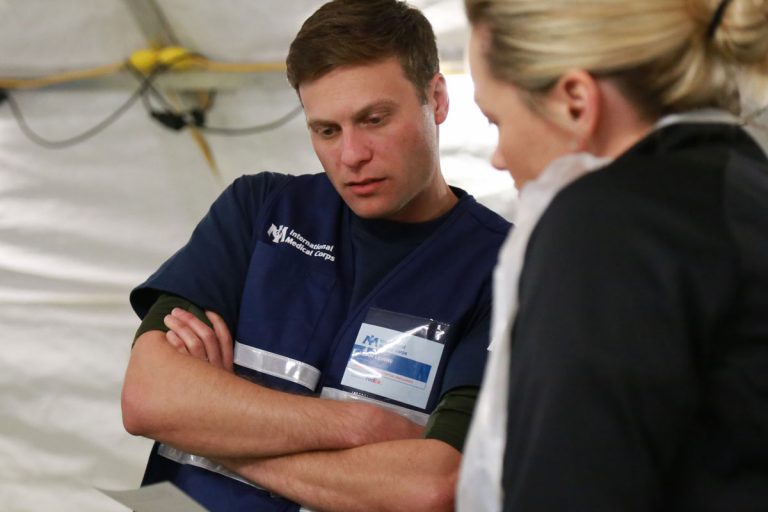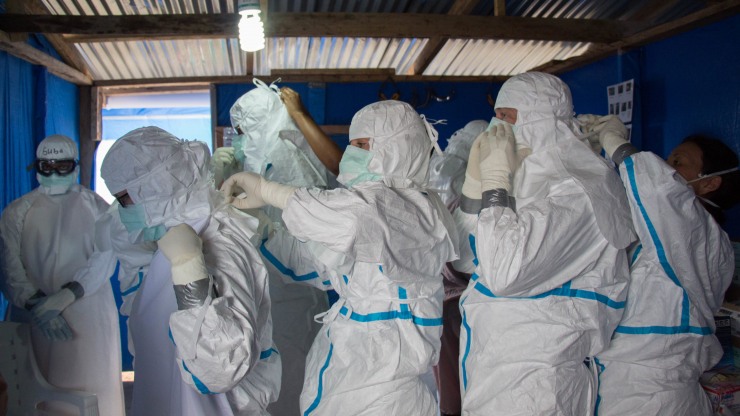Dr. Adam Levine helped to find effective treatments for Ebola - now, he's working with a global relief organization to ramp up the medical response to COVID-19 in high-risk countries.
PROVIDENCE, R.I. [Brown University] - As hospitals across the globe brace for a rising influx of patients sick with COVID-19 symptoms, one Brown University faculty member is encouraging health care leaders and health workers to embrace lessons learned from the recent global fight against Ebola.
Dr. Adam Levine, an associate professor of emergency medicine at Brown, has been on the front lines of that fight since 2014, when he helped to launch the International Medical Corps' (IMC) first Ebola treatment center in Liberia and was among the many medical professionals to be collectively named TIME's Person of the Year. He serves today as principal investigator for the IMC Global Emergency Response and Recovery Project and recently assisted in carrying out a series of experimental treatments for Ebola that proved highly promising.

Levine has now begun to fight COVID-19 with the same fervor. As director of the Center for Human Rights and Humanitarian Studies at the Watson Institute for International and Public Affairs, he launched a new partnership with Project HOPE, a global humanitarian relief organization. Together, the two entities will provide COVID-19 treatment training for health workers to rapidly scale up response efforts in high-risk countries, including parts of the Balkans, Africa and the Caribbean.
Levine, who is also an emergency physician, shared his thoughts about Ebola, COVID-19 and the biggest challenges that health care workers face in settings where resources are limited.
Q: What was the biggest lesson you learned in the fight against Ebola?
That we were fighting not one, but two epidemics - an epidemic of Ebola virus disease and an epidemic of fear - and both had to be addressed simultaneously. For the larger community, this meant ensuring clear and consistent messaging that communicates the threat of the disease and reasonable measures that people could take to minimize its impact, without causing people to panic. For health workers, this meant ensuring their safety through adequate personal protective equipment and protocols, so that they felt safe enough to come to work and care for patients. Without addressing the epidemic of fear, we would never have been able to end the epidemic of Ebola virus disease.
Q: What lessons from the Ebola crisis should inform the work to slow the spread of COVID-19 and then treat and eventually vaccinate against coronavirus?
As bad as the Ebola epidemic was in West Africa, killing nearly 12,000 people, the secondary effects were far worse. It's estimated that tens of thousands, if not hundreds of thousands, died from other causes during the Ebola epidemic, such as malaria, measles and even childbirth, simply because health workers were too afraid to come to work and most of the hospitals and clinics in the country were closed as a result. Public health measures such as routine childhood vaccination and malnutrition screening also stopped as all efforts focused on fighting Ebola.
We are likely to see something similar here in the U.S. - partly as a result of health workers not being willing (already many primary care offices have closed) or able to come to work (due to childcare responsibilities from schools being closed or because they get sick themselves), but mostly due to the millions of Americans who are about to lose their health insurance and their ability to afford their medications as they lose their jobs due to the shuttering of small businesses in response to this outbreak. If we don't act quickly to mitigate this secondary disaster, it will almost certainly cause many more deaths in the long term than COVID-19.
Q: As resources such as masks and ventilators become scarcer, health providers may need to choose which patients to prioritize. What factors should they consider as they confront this extremely difficult reality?
Many health workers who have never had to provide health care in a resource-limited setting may soon find themselves learning what it means to ration care. And they will discover, as I have, that rationing is rarely very rational. While many guidelines have been developed on the ethical rationing of care, they tend to be vague and difficult for clinicians to apply to the unique circumstances of the patient in front of them. In the end, they will find that it's very difficult to take someone off a ventilator, even if it means giving someone with a better chance of survival access to it.
I think the most important thing is for health workers to ensure that their own implicit biases about who deserves care the most do not affect their decisions about who needs that care the most. With each such decision, they need to stop and ask themselves whether they are being truly objective, or biased by factors unrelated to patient need.
Q: You are partnering with Project HOPE to develop a training program that will scale up COVID-19 response efforts in high-risk countries. Why is this effort important, and what do you hope to achieve?
As bad as the epidemic is now in East Asia, Europe and North America, its impact will be far worse in low- and middle-income countries, which already have shortages of medical supplies and health professionals, and are unable to inject the billions of dollars into their health systems and economies that high-income countries have been able to do in response to this pandemic. The goal of this partnership with Project HOPE is to help health workers in those low- and middle-income countries prevent the spread of COVID-19 in their communities and hospitals and minimize its impact on patients and the health care system at large. We are using a "training of the trainers" approach, where we will initially remotely train health leaders in places like the Balkans, Indonesia, Africa and the Caribbean, who will then go on to train hundreds of other health workers in their own countries.
Q; What can the public do to support health care workers right now?
Say thank you. A few years back, I gave a talk to a group of Naval officers about my experiences fighting Ebola in West Africa. Afterwards, one of the participants came up to me and said, "Thank you for your service." As a civilian, no one had ever said that to me before, and I was surprised by how deeply that affected me. If you're unsure how best to support the health workers in your life, a simple thank you may go a long way.







